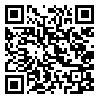University of Kashan
Abstract: (927 Views)
Introduction: Academic boredom is a common yet underexplored negative emotion in medical education, adversely affecting students' motivation and academic performance. Identifying its contributing factors is crucial. This study examined the relationship between teacher-student rapport and perceived emotional support with academic boredom among medical students at Kashan University of Medical Sciences.
Method: This descriptive-correlational study included all medical students at Kashan University of Medical Sciences in the 1403 academic year. A total of 435 students were selected using stratified random sampling. Data were collected via the Teacher Emotional Support Scale by Federici and Skaalvik, the Teacher-Student Relationship Scale by Murray and Zvoch, the Academic Boredom Scale by Pekrun, the Boredom Proneness Scale, and a demographic questionnaire. Data analysis was conducted using multiple regression in SPSS version 24.
Results: Multiple regression analysis revealed that, after controlling for age, gender, and trait boredom, communication (ß = -0.252, p ≤ 0.01) and trust (ß = -0.165, p ≤ 0.01) as components of teacher-student rapport, along with perceived emotional support from teachers (ß = -0.237, p ≤ 0.01), were significant inverse predictors of academic boredom.
Conclusion: Teacher-student rapport and perceived emotional support play a vital role in reducing academic boredom among medical students. Open communication, trust-building, and emotional support can serve as protective factors. These findings emphasize the need for targeted interventions to equip educators with strategies for fostering supportive learning environments.
Method: This descriptive-correlational study included all medical students at Kashan University of Medical Sciences in the 1403 academic year. A total of 435 students were selected using stratified random sampling. Data were collected via the Teacher Emotional Support Scale by Federici and Skaalvik, the Teacher-Student Relationship Scale by Murray and Zvoch, the Academic Boredom Scale by Pekrun, the Boredom Proneness Scale, and a demographic questionnaire. Data analysis was conducted using multiple regression in SPSS version 24.
Results: Multiple regression analysis revealed that, after controlling for age, gender, and trait boredom, communication (ß = -0.252, p ≤ 0.01) and trust (ß = -0.165, p ≤ 0.01) as components of teacher-student rapport, along with perceived emotional support from teachers (ß = -0.237, p ≤ 0.01), were significant inverse predictors of academic boredom.
Conclusion: Teacher-student rapport and perceived emotional support play a vital role in reducing academic boredom among medical students. Open communication, trust-building, and emotional support can serve as protective factors. These findings emphasize the need for targeted interventions to equip educators with strategies for fostering supportive learning environments.
Keywords: boredom, Teacher-student rapport, Emotional support, Educational environment, Medical students
Send email to the article author
| Rights and permissions | |
 |
This work is licensed under a Creative Commons Attribution-NonCommercial 4.0 International License. |







